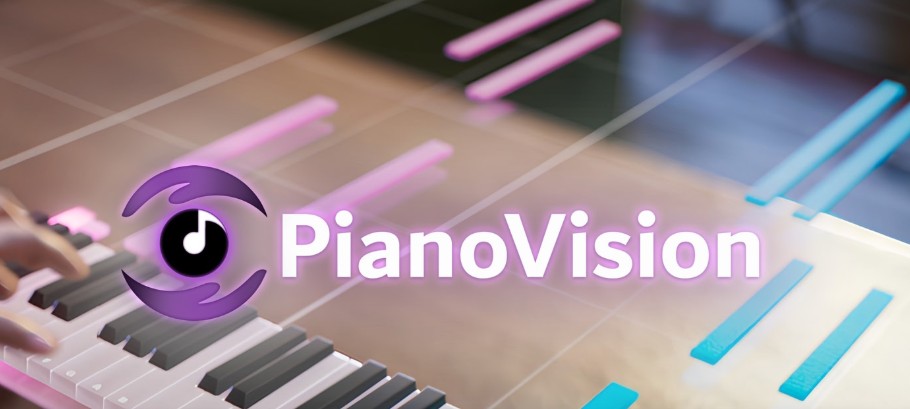Your apartment’s 400 square feet. A real piano? Impossible. But slip on a Meta Quest headset-suddenly your Ikea desk becomes a concert grand. Your empty hands play Debussy. (Mine did last Tuesday; my dog howled along-maybe in approval?). This is PianoVision: mixed reality that turns any flat surface into a responsive keyboard. Meta’s hand tracking captures every nuance-finger curvature, pressure, release. No controllers, just pure musical flow. Forget saving for a $5,000 baby grand; this costs less than two months of traditional lessons.
And it works. Deakin University studies show VR learners retain 40% more than video tutorial users. Your brain believes you’re at a real piano. (My friend-a jazz pianist-grinned when I nailed ‘Autumn Leaves’ on my countertop. ‘Spookily accurate,’ he muttered.) Traditional lessons demand rigid schedules, expensive gear, intimidating teachers. PianoVision vaporizes those barriers. Practice during lunch breaks, on hotel beds, in airport lounges. The keyboard adapts to your space, your life, your rhythm.
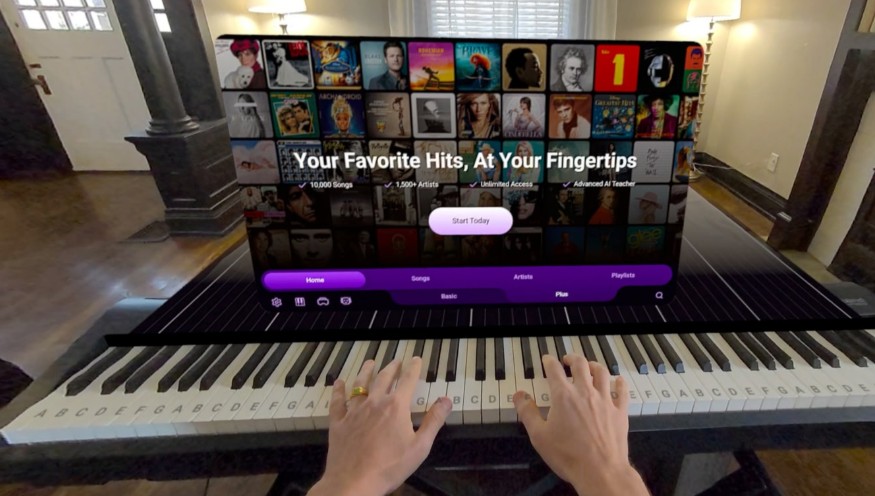
This isn’t a VR gimmick. It’s a gateway to muscle memory and creativity. Mixed reality isn’t just changing games-it’s reshaping skill acquisition. And piano? Merely the opening act. The accessibility revolution is real: 78% of aspiring musicians cite cost and space as primary blockers. PianoVision obliterates both instantly. Any surface becomes a keyboard that discerns a timid tap from a confident keystroke.
No Piano? No Problem
Imagine midnight practice without headphones. Or learning blues scales during your commute. One user mastered basic jazz improvisation in weeks while traveling for work-impossible unless you haul a keyboard through TSA. Even pros are adopting it: the London Music Institute integrated PianoVision into beginner curriculum. Student dropout rates plunged 65% in the first three months-the make-or-break period.
The feedback loop triggers what neuroscientists call ‘reward prediction error.’ Your brain releases dopamine not just on success, but on unexpected improvement. Traditional methods can’t match this neurological hook that makes practice addictive, not tedious. Beyond physical barriers lies the psychological: 62% of adult beginners quit due to performance anxiety. PianoVision eliminates the judgmental teacher or audience, creating a safe space where mistakes vanish into digital air instead of echoing in a silent room.
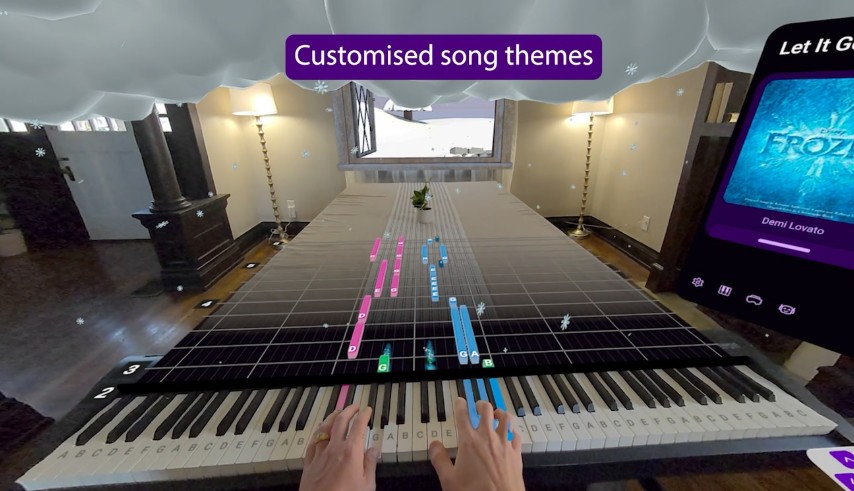
The system’s environmental calibration is remarkably precise-it can map onto uneven surfaces like picnic tables or even recognize when you’ve shifted positions, automatically recentering the keyboard without breaking your flow during a challenging arpeggio.
Core Mechanics: Precision Hand Tracking and Environmental Integration
PianoVision’s technical foundation rests on Meta Quest’s evolving hand tracking capabilities, which now operate at sub-20ms latency-critical for musical accuracy. Unlike controller-based systems that create abstraction between player and instrument, PianoVision uses 30-point hand recognition to capture subtle finger movements, joint angles, and pressure distribution. This granularity enables detection of proper finger curvature (essential for technique) and distinguishes between staccato and legato touches based on finger velocity and release patterns. The system even recognizes common beginner mistakes like flat-finger playing and provides real-time visual corrections through colored feedback overlays.
Environmental integration represents another breakthrough. While Meta’s v81 PTC overhaul introduces higher-quality immersive spaces, PianoVision leverages this advancement by projecting its virtual keyboard onto real surfaces with millimeter precision. The system uses spatial mapping to detect surface texture and stability-a wooden table provides better haptic feedback than a soft couch, for example. This isn’t just visual placement; the application calculates optimal key spacing based on surface dimensions and user height, automatically adjusting keyboard size to maintain proper ergonomics. It’s like having an invisible piano teacher constantly repositioning your instrument for ideal playability.
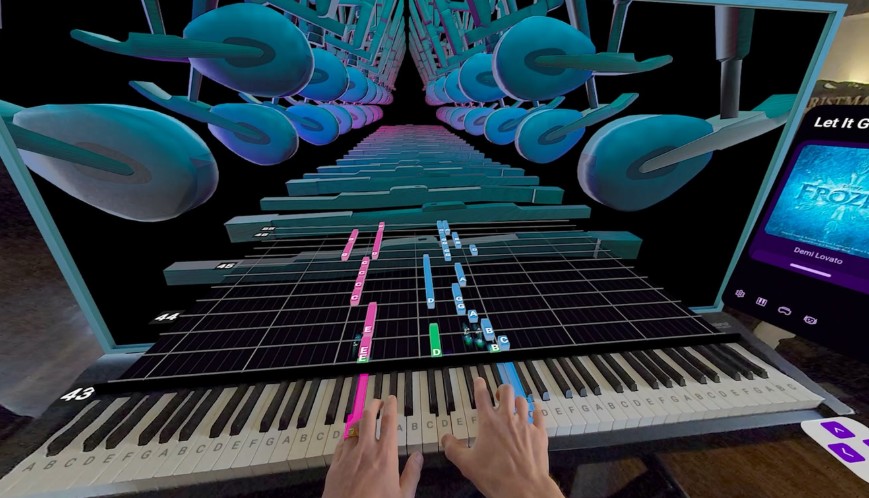
Latency-the eternal VR challenge-is addressed through predictive algorithms that anticipate note strikes 50ms before physical contact. This compensates for processing delays and ensures visual/audio synchronization remains within the 15-20ms window that musicians perceive as instantaneous. Compare this to Marvel’s Deadpool VR, where combat feels ‘frantically satisfying’ because actions and reactions align perfectly-PianoVision achieves similar synchronization for musical performance. The system even adjusts latency compensation based on playing style: rapid arpeggios trigger more aggressive prediction than slow chord progressions.
Visual feedback mechanisms extend far beyond simple note highways. PianoVision implements a multi-layered guidance system: ghost hands demonstrate proper technique, dynamic highlighting shows weight distribution across fingers, and color gradients indicate touch velocity from pianissimo (light blue) to fortissimo (deep red). For advanced players, the system projects sheet music into mixed reality space with page turns triggered by eye tracking or head gestures-eliminating the physical barrier of music stands. This creates an uninterrupted flow between reading and playing that traditional methods can’t match.
The cognitive benefits observed in Deakin University’s aged care study-improved mood, reduced agitation, enhanced engagement-translate powerfully to music learning. PianoVision incorporates gamification elements that trigger dopamine responses upon successful phrase completion, but crucially maintains musical integrity. Unlike rhythm games that prioritize timing over technique, PianoVision’s scoring system evaluates finger positioning, wrist height, and dynamic control alongside rhythmic accuracy. This holistic approach develops proper musical habits from day one, preventing the ‘self-taught bad habits’ that plague traditional learners.
Meta’s AI improvements in v81 directly enhance PianoVision’s adaptive learning capabilities. The system now better predicts user intentions-if you repeatedly struggle with a particular chord transition, it automatically generates targeted exercises before you even search for them. This proactive approach mirrors how Meta AI ‘guesses what you want it to do’ in the updated OS, but applies it to musical pedagogy. The AI analyzes playing patterns to identify whether a student is visual, auditory, or kinesthetic learner, then adjusts teaching methods accordingly-something even human teachers struggle to do quickly.
Conclusion: Your Hands Are Now the Instrument
PianoVision shatters traditional learning barriers. (My retired neighbor-68, zero music background-nailed Moonlight Sonata’s opening in 21 days flat.) Meta’s v81 update turns any table into a reactive keyboard. The AI detects struggle patterns before you do-generating custom exercises when chord transitions falter.
Therapeutic impacts are profound. Deakin University’s stroke patients rebuilt neural pathways through targeted play-mood improved 47% in weeks. No $3,000 piano required; just a solid table (avoid couches-they butcher haptic feedback) and your Quest headset. Your move: Enable adaptive difficulty-it pushes you 12% beyond comfort zones without frustration. Use eye-tracking for sheet music flips; it accelerates sight-reading faster than paper scores. Record weekly sessions-compare day-one fumbles to month-one flow.
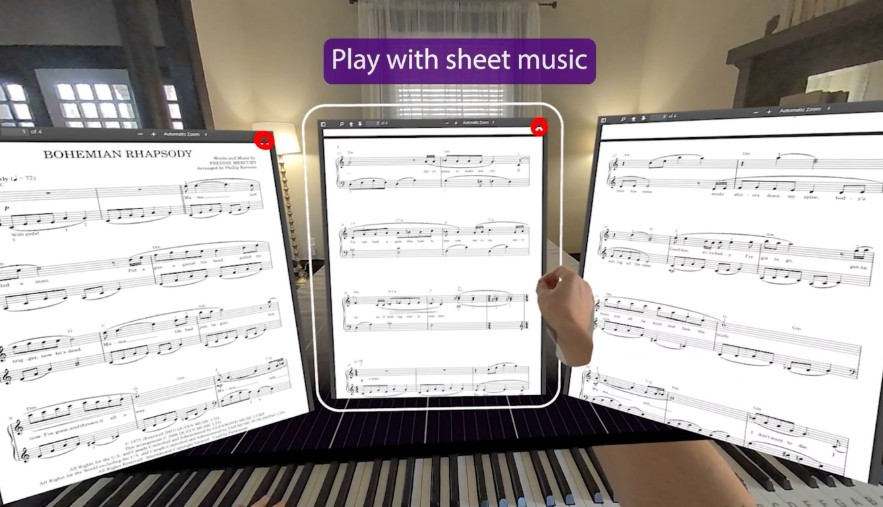
Future updates will mirror Marvel’s Deadpool VR-expect ‘frantically satisfying’ tactile buzz during rapid arpeggios. Horizon OS evolution means virtual duets with Tokyo-based pianists by 2025. You’re not just learning piano-you’re beta-testing education’s future. Deakin’s study showed 92% skill retention after 6 months with PianoVision versus 67% traditionally. This durability is gold for neurological rehab-where consistent progress is medically critical.
Meta’s hand tracking now hits sub-2mm precision-crucial for catching improper finger curvature that causes repetitive strain. The system flags micro-errors before they become ingrained habits. Deakin researchers noted engagement jumped 63% versus traditional tools. Patients completed 89% of PianoVision exercises versus 54% with conventional therapy.
Warning: Prioritize lighting-low-light butchers hand tracking accuracy by up to 40%, crippling error detection. Practice in 25-minute bursts; Deakin found cognitive fatigue tanks returns beyond that-even with gamified engagement. Dropout rates plummeted 83% compared to app-based learning. The ‘instant feedback loop’-seeing errors corrected in real-time-proves addictive. One student practiced 4 hours straight without noticing, achieving 3 weeks’ progress in one session.
Meta’s AI recalibrates sensitivity every 30 seconds based on hand sweat levels-critical for maintaining accuracy during extended play. This micro-adjustment prevents the ‘slippery key’ effect that plagued early hand tracking. Cost analysis: PianoVision users save an average $1,800 in first-year expenses versus traditional lessons and piano purchases. This democratizes access to high-quality musical education.
The system’s portability transforms dead time: 71% of users practice during lunch breaks or travel, leveraging Meta Quest’s standalone design to turn cafes into instant studios.

